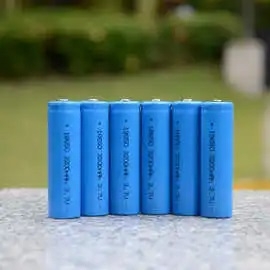Due to its large capacity per unit density, 18650 lithium batteries are mostly used in laptop batteries. In addition, 18650 lithium batteries
have very good stability at work and are widely used in various
electronic fields: often used in high-end strong light Flashlights,
portable power supplies, wireless data transmitters, electric thermal
clothing and shoes, portable instruments, portable lighting equipment,
portable printers, industrial instruments, medical instruments, etc.
So
how to choose a high-quality 18650 lithium-ion battery? Choose the most
suitable 18650 lithium battery according to our electrical equipment,
such as the appropriate brand, voltage, capacity, continuous discharge
rate, battery life, etc. The most important thing is to choose a battery
with high safety.

1. Brand
Regarding
brands, currently the more reliable ones include internationally
renowned brands such as Sanyo, Samsung, SONY, and LG. Sanyo and LG focus
on conventional products, and their main applications are bright
flashlights, power banks, laptop batteries, etc. SONY is professional,
focusing on power and high current. Taking VTC4 as an example, the
discharge current can reach 30A, which can be easily used by electronic
cigarettes, toys, etc.
2. Nominal capacity
The nominal capacity of the 18650 battery
is related to the battery life, and the unit is "mAh". The higher the
capacity, the stronger the battery life. For example, a 2800mAh battery
can be continuously discharged for 2 hours with a current of 1.4A.
3. Continuous discharge current (CDR)
Continuous
discharge capability is represented by C number. Continuous discharge
current = Continuous discharge capability C number × capacity. For
example, the capacity of an 18650 battery is 2800mAh, and the continuous
discharge capacity is 0.5C, then the continuous discharge current =
1.4A. Discharging more than 1.4A for a long time will seriously affect
the battery life, and may cause overheating, even burning, explosion,
etc. .
5. Internal resistance
The
internal resistance is the resistance of the battery itself. The
smaller the internal resistance, the less consumption and stronger the
discharge capacity. The internal resistance parameter is usually written
on the battery introduction page. You should also pay attention to it
when purchasing, and try not to Buy batteries with more than 100mΩ. When
using multiple 18650 cells in series, be sure to buy batteries of the
same brand and model, otherwise batteries with high internal resistance
and low capacity will become shortcomings.
6. Temperature
Temperature
is a major factor that affects the life of 18650 lithium batteries. The
higher the temperature, the faster the battery will age. The higher the
temperature, the greater the damage to the internal parts of the
battery.
7. Pointed and flat ends
18650
lithium batteries are also divided into flat ends and pointed ends. In
the picture below, the positive electrode on the left has a protruding
part, which is a pointed end, and the positive electrode on the right,
which has no protruding part, is a flat end. In general, I recommend
purchasing pointed batteries to ensure compatibility with more devices
and uses. Usually the positive and negative poles of flashlights are
designed with springs and can be retracted. Both pointed and flat
batteries can be used. But if you want to use flat-head batteries in
series connection, the positive terminal of the flat head cannot contact
the negative terminal of another battery.
8. With or without protective plate
The
pointed head 18650 has a protective plate, and the flat head 18650 does
not have a protective plate. The 18650 lithium battery with a
protective plate is a few mm taller than the 18650 lithium battery
without a protective plate, and the price is slightly more expensive,
but it is safer and more versatile. The 18650 lithium battery with a
protective plate can prevent the battery from over-discharging, which
can cause Lithium batteries generate heat and may even burn or explode.
Among
all 18650 lithium-ion batteries, LiSOCl2 has the highest energy density
and a longest life of 15 to 20 years. This type of battery is
particularly suitable for devices whose power supply current is small
and relatively short. Due to the long battery life and low
self-discharge rate, the environmental resistance of the battery is also
very good.
BENZO Energy Technology Co.,Ltd
UFine Technology Co., Ltd
![]() TEL: +86-755-84822012
TEL: +86-755-84822012
![]() TEL: +86-13538185686
TEL: +86-13538185686
![]() Email: contact@benzoenergy.com
Email: contact@benzoenergy.com
![]() Email: sales02@benzoenergy.com
Email: sales02@benzoenergy.com
![]() Email: sales03@benzoenergy.com
Email: sales03@benzoenergy.com
![]() Email: sales01@benzoenergy.com
Email: sales01@benzoenergy.com
![]() Skype: benzobattery1231@gmail.com
Skype: benzobattery1231@gmail.com
![]() Office Address:Building C1, Bantian International Center, BanTian Street, Longgang area, Shenzhen City, China
Office Address:Building C1, Bantian International Center, BanTian Street, Longgang area, Shenzhen City, China
![]() Factory Address 1: Luoma Second Bridge, Tiansheng Lake Villager Group, Luoma Village, QingXi Town, DongGuan, China
Factory Address 1: Luoma Second Bridge, Tiansheng Lake Villager Group, Luoma Village, QingXi Town, DongGuan, China
![]() Factory Address 2: Building
41, Zhongnan HighTech Rongzhi Chuangmei Industrial Valley, Siqian Town,
Xinhui District, Jiangmen City, Guangdong, China
Factory Address 2: Building
41, Zhongnan HighTech Rongzhi Chuangmei Industrial Valley, Siqian Town,
Xinhui District, Jiangmen City, Guangdong, China
Site: www.bz-battery.com / www.benzoenergy.com
Comments
Post a Comment